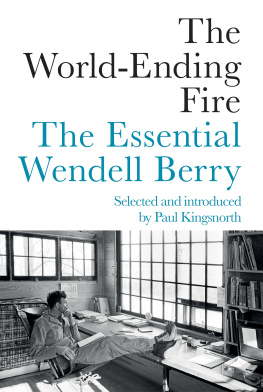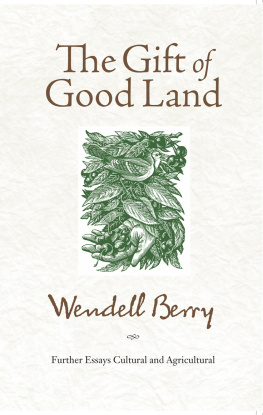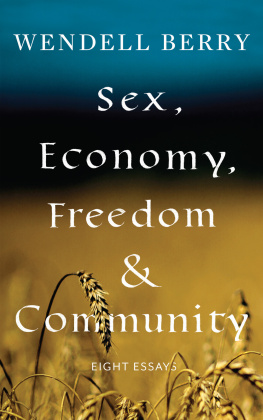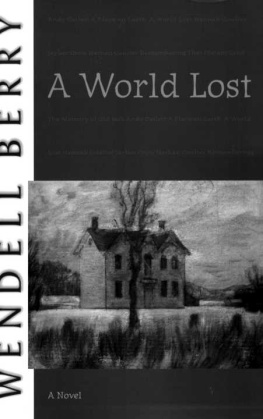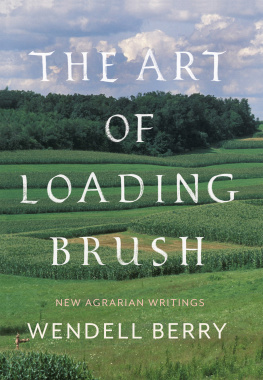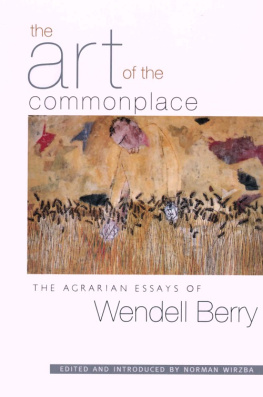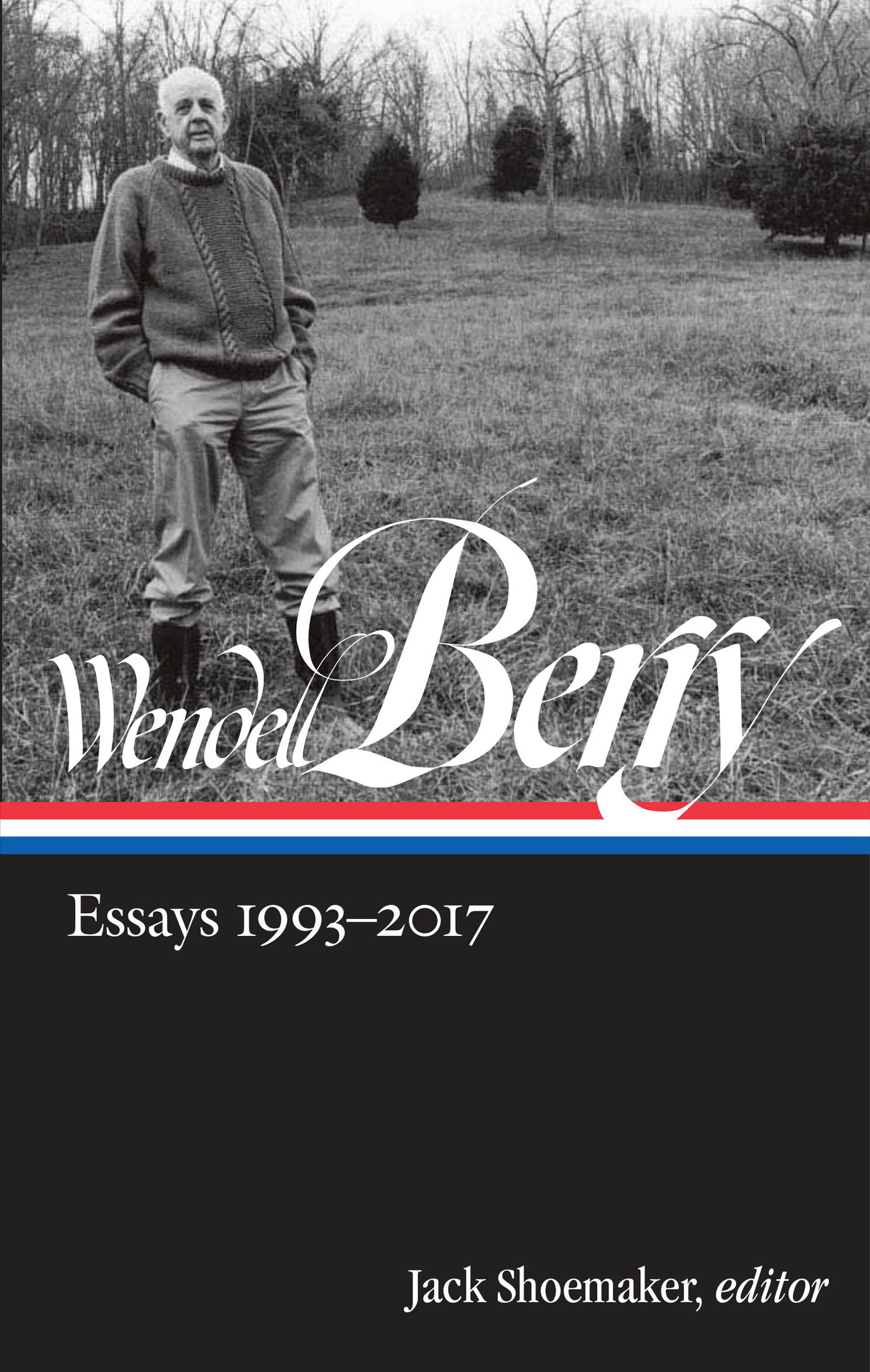W ENDELL B ERRY
ESSAYS 19932017
INCLUDING
Life Is a Miracle
AND SELECTIONS FROM
Sex, Economy, Freedom & Community
Another Turn of the Crank
Citizenship Papers
The Way of Ignorance
What Matters?
Imagination in Place
It All Turns on Affection
Our Only World
The Art of Loading Brush
Jack Shoemaker, editor

LIBRARY OF AMERICA E-BOOK CLASSICS
WENDELL BERRY: ESSAYS 19932017
Volume compilation, notes, and chronology copyright 2019 by
Literary Classics of the United States, Inc., New York, N.Y.
All rights reserved.
No part of this book may be reproduced in any manner whatsoever without
the permission of the publisher, except in the case of brief
quotations embodied in critical articles and reviews.
Published in the United States by Library of America
LIBRARY OF AMERICA, a nonprofit publisher,
is dedicated to publishing, and keeping in print,
authoritative editions of Americas best and most
significant writing. Each year the Library adds new
volumes to its collection of essential works by Americas
foremost novelists, poets, essayists, journalists, and statesmen.
Visit our website at www.loa.org to find out more about
Library of America, and to sign up to receive our
occasional newsletter with exclusive interviews with
Library of America authors and editors, and our popular
Story of the Week e-mails.
eISBN 978-1-59853-609-6
To Mary and Den
my children
with thanks
Contents
FROM
SEX, ECONOMY,
FREEDOM & COMMUNITY
(1993)
Conservation and Local Economy
I N OUR RELATION to the land, we are ruled by a number of terms and limits set not by anyones preference but by nature and by human nature:
I .Land that is used will be ruined unless it is properly cared for.
II .Land cannot be properly cared for by people who do not know it intimately, who do not know how to care for it, who are not strongly motivated to care for it, and who cannot afford to care for it.
III .People cannot be adequately motivated to care for land by general principles or by incentives that are merely economicthat is, they wont care for it merely because they think they should or merely because somebody pays them.
IV .People are motivated to care for land to the extent that their interest in it is direct, dependable, and permanent.
V .They will be motivated to care for the land if they can reasonably expect to live on it as long as they live. They will be more strongly motivated if they can reasonably expect that their children and grandchildren will live on it as long as they live. In other words, there must be a mutuality of belonging: they must feel that the land belongs to them, that they belong to it, and that this belonging is a settled and unthreatened fact.
VI .But such belonging must be appropriately limited. This is the indispensable qualification of the idea of land ownership. It is well understood that ownership is an incentive to care. But there is a limit to how much land can be owned before an owner is unable to take proper care of it. The need for attention increases with the intensity of use. But the quality of attention decreases as acreage increases.
VII .A nation will destroy its land and therefore itself if it does not foster in every possible way the sort of thrifty, prosperous, permanent rural households and communities that have the desire, the skills, and the means to care properly for the land they are using.
In an age notoriously impatient of restraints, such a list of rules will hardly be welcome, but that these are the rules of land use I have no doubt. I am convinced of their authenticity both by common wisdom and by my own experience and observation. The rules exist; the penalties for breaking them are obvious and severe; the failure of land stewardship in this country is the result of a general disregard for all of them.
As proof of this failure, there is no need to recite again the statistics of land ruination. The gullies and other damages are there to be seen. Very little of our land that is being usedfor logging, mining, or farmingis being well used. Much of our land has never been well used. Those of us who know what we are looking at know that this is true. And after observing the worsening condition of our land, we have only to raise our eyes a little to see the worsening condition of those who are using the land and who are entrusted with its care. We must accept as a fact that by now, our country (as opposed to our nation) is characteristically in decline. War, depression, inflation, usury, the attitudes of the industrial economy, social and educational fashionsall have taken their toll. For a long time, the news from everywhere in rural America has been almost unrelievedly bad: bankruptcy, foreclosure, depression, suicide, the departure of the young, the loneliness of the old, soil loss, soil degradation, chemical pollution, the loss of genetic and specific diversity, the extinction or threatened extinction of species, the depletion of aquifers, stream degradation, the loss of wilderness, strip mining, clear-cutting, population loss, the loss of supporting economies, the deaths of towns. Rural American communities, economies, and ways of life that in 1945 were thriving and, though imperfect, full of promise for an authentic human settlement of our land are now as effectively destroyed as the Jewish communities of Poland; the means of destruction were not so blatantly evil, but they have proved just as thorough. The news of rural decline and devastation has been accompanied, to be sure, by a chorus of professional, institutional, and governmental optimists, who continue to insist that all is well, that we are making things worse only as a way of making things better, that farmers who failed are merely inefficient producers for whose failure the country is better off, that money and technology will fill the gaps, that government will fill the gaps, that science will soon free us from our regrettable dependence on the soil. We have heard that it is good business and good labor economics to destroy the last remnants of American wilderness. We have heard that the rural population is actually growing because city people are moving to the country and commuters are replacing farmers. We have heard that the rural economy can be repaired by moving the urban economy out into the country and by replacing rural work with work in factories and offices. And all the while the real conditions of the rural land and the rural people have been getting worse.
Of the general condition of the American countryside, my own community will serve well enough as an example. The town of Port Royal, Kentucky, has a population of about one hundred people. The town came into existence as a trading center, serving the farms in a few square miles of hilly country on the west side of the Kentucky River. It has never been much bigger than it is now. But whereas now it is held together by habit or convenience, once it was held together by a complex local economy. In my mothers childhood, in the years before World War I, there were sixteen business and professional enterprises in the town, all serving the town and the surrounding farms. By the time of my own childhood, in the years before World War II, the number had been reduced to twelve, but the town and its tributary landscape were still alive as a community and as an economy. Now, counting the post office, the town has five enterprises, one of which does not serve the local community. There is now no market for farm produce in the town or within forty miles. We no longer have a garage or repair shop of any kind. We have had no doctor for forty years and no school for thirty. Now, as a local economy and therefore as a community, Port Royal is dying.


